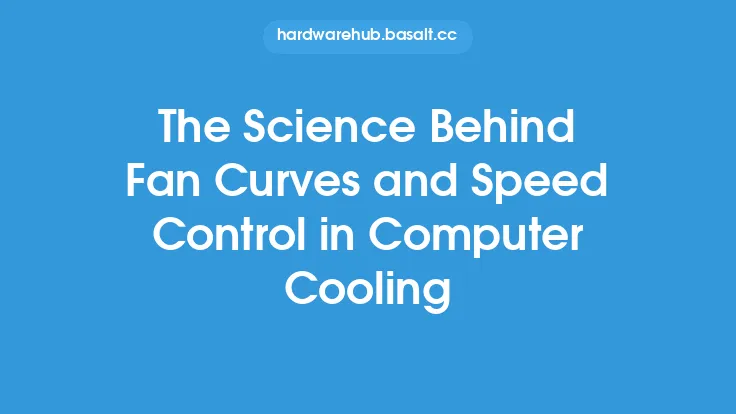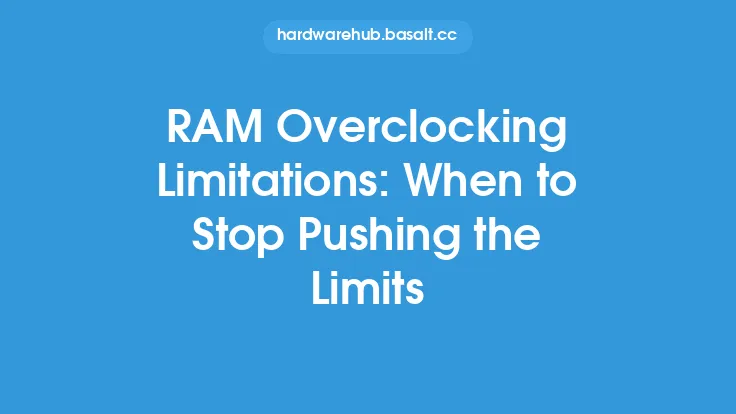When it comes to computer hardware, one of the most critical components is the Random Access Memory (RAM). It plays a vital role in determining the overall performance of a system, and overclocking it can lead to significant improvements in speed and efficiency. However, the process of overclocking RAM is complex and involves a deep understanding of the underlying science. In this article, we will delve into the technical aspects of RAM overclocking, exploring the fundamental principles and mechanisms that govern this process.
Introduction to RAM Architecture
To understand the science behind RAM overclocking, it's essential to have a basic knowledge of RAM architecture. Modern RAM modules, such as DDR4 and DDR5, consist of multiple components, including the memory controller, the memory array, and the input/output (I/O) interface. The memory controller manages data transfer between the system and the memory array, while the I/O interface handles communication with the external world. The memory array itself is composed of millions of tiny transistors and capacitors that store data in the form of electrical charges.
The Role of Latency and Bandwidth
Two critical parameters that affect RAM performance are latency and bandwidth. Latency refers to the time it takes for the RAM to respond to a request, while bandwidth represents the amount of data that can be transferred per unit time. In the context of RAM overclocking, reducing latency and increasing bandwidth are primary objectives. By tweaking the RAM timings, such as the CAS Latency (CL), RAS-to-CAS Delay (tRCD), and RAS Precharge Time (tRP), overclockers can minimize latency and maximize bandwidth.
The Impact of Voltage and Frequency
Voltage and frequency are two essential factors that influence RAM performance. Increasing the voltage supplied to the RAM can improve its stability and allow for higher frequencies, but it also increases power consumption and heat generation. On the other hand, boosting the frequency can enhance bandwidth, but it may also introduce errors and instability. The relationship between voltage and frequency is complex, and finding the optimal balance is crucial for successful RAM overclocking.
Signal Integrity and Noise Margin
As RAM frequencies increase, signal integrity becomes a significant concern. Signal integrity refers to the quality of the electrical signals transmitted between the RAM and the system. At high frequencies, these signals can become distorted, leading to errors and instability. Noise margin, which represents the difference between the signal voltage and the noise floor, plays a critical role in maintaining signal integrity. Overclockers must carefully optimize the RAM timings and voltage levels to ensure adequate noise margin and prevent signal degradation.
The Importance of Memory Controller and Chipset
The memory controller and chipset are vital components that interact with the RAM and influence its performance. The memory controller manages data transfer, while the chipset provides the interface between the RAM and the system. The quality and capabilities of these components can significantly impact RAM overclocking. For example, a high-quality memory controller can provide more flexible timing options and better signal integrity, making it easier to achieve stable overclocks.
Thermal Management and Cooling
Thermal management is a critical aspect of RAM overclocking. As the RAM operates at higher frequencies and voltages, it generates more heat, which can lead to instability and damage. Effective cooling systems, such as heat spreaders and fans, are essential for maintaining a stable temperature and preventing overheating. Overclockers must carefully monitor the RAM temperature and adjust the cooling system accordingly to ensure reliable operation.
The Science of RAM Overclocking Limits
Every RAM module has its limits, beyond which overclocking becomes impractical or even impossible. These limits are determined by various factors, including the quality of the RAM chips, the memory controller, and the chipset. The maximum frequency, voltage, and timing limits are influenced by the physical properties of the RAM components, such as the transistor size, capacitance, and resistance. Understanding these limits is crucial for overclockers, as pushing the RAM beyond its capabilities can result in instability, errors, or even permanent damage.
Conclusion and Future Directions
In conclusion, the science behind RAM overclocking is complex and multifaceted, involving a deep understanding of RAM architecture, latency, bandwidth, voltage, frequency, signal integrity, and thermal management. As technology advances, new challenges and opportunities emerge, such as the development of faster and more efficient RAM technologies, like DDR5 and beyond. By grasping the fundamental principles and mechanisms that govern RAM overclocking, enthusiasts and professionals can unlock the full potential of their systems and push the boundaries of performance and efficiency. As the field continues to evolve, it's essential to stay informed about the latest developments and advancements in RAM technology to maximize the benefits of overclocking and minimize the risks.





